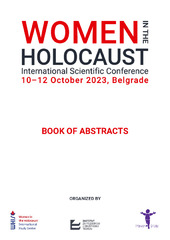| dc.contributor | Stojanović, Dragana | |
| dc.contributor | Mevorah, Vera | |
| dc.contributor | Halpert Zamir, Lily | |
| dc.creator | Plećaš, Tamara | |
| dc.date.accessioned | 2023-11-09T13:10:31Z | |
| dc.date.available | 2023-11-09T13:10:31Z | |
| dc.date.issued | 2023 | |
| dc.identifier.isbn | 978-86-82324-43-0 | |
| dc.identifier.uri | http://rifdt.instifdt.bg.ac.rs/123456789/3156 | |
| dc.description.abstract | This presentation is divided into two segments. The first explores the woman’s perspective from a male viewpoint, while the second delves into the woman’s perspective from a female standpoint. The Mauthausen Trilogy, known as The Ballad of Mauthausen, composed by Greek artist Mikis Theodorakis, serves as a poignant example of Holocaust narratives. Within this trilogy, the Song of Songs, which features evocative lyrics by the Greek poet Iakovos Kambanellis, provides a glimpse into the human experience of love and loss within the harrowing context of the Holocaust. Namely, the Song of Songs (Asma asmaton) captures Kambanellis’ affection for a Lithuanian-Jewish woman. Kambanellis, himself a survivor of the Mauthausen-Gusen concentration camp, subsequently channeled his personal Holocaust experiences into an autobiographical novel. While acknowledging the predominant male perspectives on Holocaust experiences, this presentation also devotes special attention to the often-overlooked female voices. One of the most renowned and impactful female testimonies of the Holocaust is The Diary of a Young Girl by Anne Frank which provides an intimate and personal account of Anne’s experiences and emotions while hiding from Nazi persecution. In addition, a special focus will be on the testimonies of Ruth Klüger, who wrote about her Holocaust experience in her autobiography Still Alive: A Holocaust Girlhood Remembered. In the concluding segment of this presentation, a key objective is to explore the commonalities and distinctions among these works in relation to the emotions of love, fear, and hope. By examining these motives, we aim to discern the shared elements and divergences within the testimonies discussed. Additionally, we will try to critically examine the notion of generalizing from individual experiences, questioning whether it is possible to extract overarching conclusions from the multifaceted and deeply personal accounts presented. | sr |
| dc.language.iso | en | sr |
| dc.publisher | Institute for Philosophy and Social Theory, University of Belgrade | sr |
| dc.relation | "info:eu-repo/grantAgreement/MESTD/inst-2020/200025/RS//" | sr |
| dc.rights | openAccess | sr |
| dc.rights.uri | https://creativecommons.org/licenses/by/4.0/ | |
| dc.source | Book of Abstracts / Women in the Holocaust International Scientific Conference, 10-12 October 2023, Belgrade | sr |
| dc.subject | female voice | sr |
| dc.subject | Holocaust testimonies | sr |
| dc.subject | Holocaust narratives | sr |
| dc.subject | The Mauthausen Trilogy | sr |
| dc.subject | emotions | sr |
| dc.title | Unveiling the Emotions of Love, Fear, and Hope: Women of the Holocaust | sr |
| dc.type | conferenceObject | sr |
| dc.rights.license | BY | sr |
| dc.identifier.cobiss | 126023433 | |
| dc.type.version | publishedVersion | sr |
| dc.identifier.fulltext | http://rifdt.instifdt.bg.ac.rs/bitstream/id/10846/bitstream_10846.pdf | |
| dc.identifier.rcub | https://hdl.handle.net/21.15107/rcub_rifdt_3156 | |

